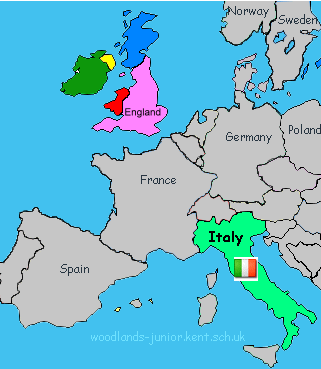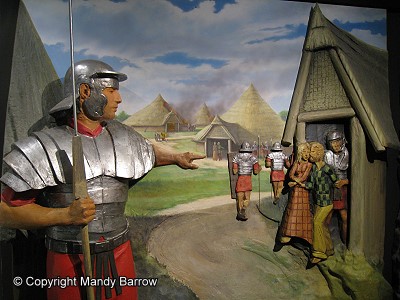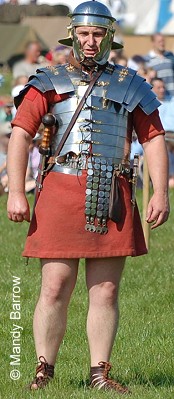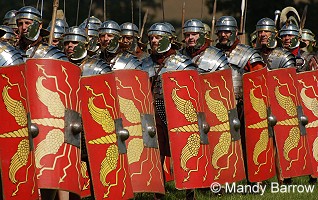
Primary Homework Help
The Romans
Celts |
Romans |
Saxons |
Vikings |
Normans |
Tudors |
Victorians |
WW ll |
500 BC |
AD 43 |
450 |
793 |
1066 |
1485 |
1837 |
1939 |
mandybarrow.com
|
The Romans in Britain
43 AD to 410 AD |
The The Romans invaded other countries too. The Roman Empire covered much of Europe, north Africa, and the Middle East.
The Romans lived in Rome, a city in the centre of the country of Italy
One day, some years before Jesus Christ was born, the Romans came to Britain.
When did the Romans invade Britain? Why did the Romans invade Britain? How many times did Julius Caesar try to invade Britain? How long did the Romans stay in Britain? What lanuage did the Romans speak? Why did the Romans leave Britain? What did the Romans call London? Why was the Roman Empire important? According to the Roman legend, Romulus was the founder of Rome. Romulus and his twin brother Remus were the sons of the God Mars. When they were very young they were abandoned by the banks of the River Tiber and left to fend for themselves. Luckily for them they were found by a she-wolf who took pity on them fed them with her milk. The boys were later found by a shepherd who raised them. The boys grew up to be very strong and clever and they decided to build a town on the spot where the Shepherd had found them. They named their town Rome.
First invasion - Caesar's first raid In August 55 B.C. (55 years before Jesus was born) the Roman general, Emperor Julius Caesar invaded Britain. He took with him two Roman legions. After winning several battles against the Celtic tribes (Britons) in south-east England he returned to France. Second invasion - Caesar's second raid The following summer (in 54 B.C.) Caesar came to Britain again landing at Walmer near Deal in Kent. This time he brought with him no fewer than five legions (30,000 foot soldiers) and 2,000 cavalrymen (horse riders). This time the Romans crossed the River Thames. After more fighting, the British tribes promised to pay tribute to Rome and were then left in peace for nearly a century.
Nearly one hundred years later, in 43 A.D. (43 years after Jesus was born), Emperor Claudius organised the final and successful Roman invasion of Britain. General Aulus Plautius led four legions with 25,000 men, plus an equal number of auxiliary soldiers. They crossed the Channel in three divisions, landing at Richborough, Dover, and Lympne. (Click here for more information on the map of Kent in Roman times) The biggest battle was fought on the banks of the River Medway, close to Rochester. It went on for two days before the Celtic tribes retreated. Many tribes tried to resist the Romans. It took about four years for the invaders to finally gain control over southern England, and another 30 years for them to conquer all of the West Country and the mountains and valleys of Wales. The battle for Yorkshire and the remainder of northern England was still underway in AD 70.
The first Roman city was Camulodunum also called Colonia Vitricencis. (We know it by the name of Colchester.) It was the seat of Roman power and governance of Brittania until sacked during the Boudiccan revolt. London was then established as a seat of governance, and only became important after the Camulodunum event.
Why the Romans came to Britain is not quite certain. Two reasons have been suggested:
The Romans remained in
The Romans spoke a form of Latin known as vulgar Latin. It was quite different from the Classical Latin that we learn today.
Their homes in Italy were being attacked by fierce tribes and every soldier was needed.
The Romans called London 'Londinium'. The River Thames was quick way to transport goods between
The Romans, even today, play an important part in our lives. Many of the things we do or have originated from the Romans.
The Romans also gave us:
Use the links, top left, for more information about the Romans. romans, woodlands romans, roman britain, hadrian's wall, the roman empire in britain, romans celts britain, roman army in britain, roman invasion in britain, roman emperor britain, roman empire for kids, ancient rome, the roman army for kids, roman gods for kids, hadrian's wall, romans roman timeline for kids, romans for kids roman army, Roman food, Roman clothing, Roman soldiers |
 © Copyright - please read © Copyright - please readAll the materials on these pages are free for homework and classroom use only. You may not redistribute, sell or place the content of this page on any other website or blog without written permission from the author Mandy Barrow. |
©Copyright Mandy Barrow 2013
primaryhomeworkhelp.com
I teach computers at The Granville School and St. John's Primary School in Sevenoaks Kent.
Follow me on Twitter @mbarrow
Woodlands Junior School, Hunt Road Tonbridge Kent TN10 4BB UK








 Third and final invasion
Third and final invasion

